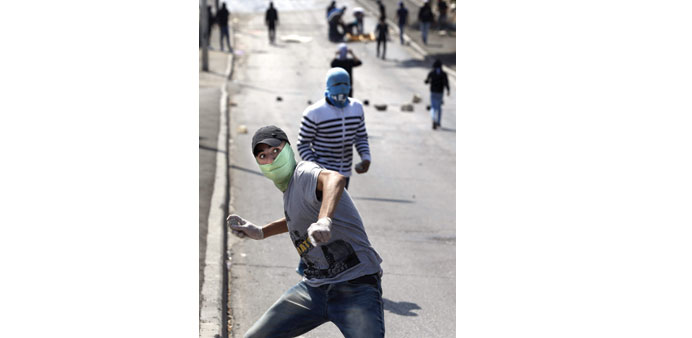A Palestinian demonstrator throws stones towards Israeli security forces during clashes yesterday in the East Jerusalem Arab neighbourhood of Issawiya.
For many Muslims, Israel’s two-day closure of the Old City to Palestinians living beyond its walls is a further sign of intent to take over the Al Aqsa compound
AFP
Jerusalem
In the Old City of Jerusalem, both Palestinians and Jews were talking yesterday about fear and the prospect of a new Intifada or uprising.
The Western Wall, visited by tens of thousands of Jews over the high holy days of the past few weeks, is at the foot of the plateau housing the Al Aqsa compound to which Muslims flocked in similar numbers for Eid al-Adha during the same period.
On Saturday night, a Palestinian killed two Israeli men and wounded a woman and a toddler in a knife and gun attack in the Old City.
The attacker, shot dead by police, was a young man from the Israeli-occupied West Bank said to be an Islamist militant and reportedly enraged by increasing Jewish encroachment on the mosque compound.
A few metres from the attack site three Palestinians sit at the foot of a wall.
A few tourists pass nearby, walking the streets of the bazaar with its now shuttered shop fronts.
Israel has barred the Old City to all but a few Palestinians who live or work there, cutting off not only the mosques but keeping local Christians from shrines such as the Church of the Holy Sepulchre.
Police barricades are at every corner. “Nobody has slept since last night,” says one of the three sitting Palestinians, asking not to be identified.
“We live in fear—we know that at any moment the settlers could come to attack us.”
He is referring to a rampage by Jewish extremists at a shopping mall outside the city walls after Saturday’s stabbings, where a flag-waving mob seeking vengeance searched for Palestinians, shouting “Death to the Arabs”.
“The Intifada started because the Israelis have worn people down to the point where they are now exploding,” he says.
Subhiyeh Abu al-Hijjeh, a veiled Muslim woman from northern Israel, says the latest events were part of an uprising “to defend Al Aqsa”.
Israeli Prime Minister Benjamin Netanyahu “does not want to understand, but Al Aqsa is a red line”, says Sheikh Kamal Khatib, deputy head of the Israeli Islamic Movement which organises Israeli Arabs to confront Jewish visitors to the site.
For many Muslims, Israel’s two-day closure of the Old City to Palestinians living beyond its walls is a further sign of intent to take over the hallowed compound, coming in the wake of restrictions on young male worshippers and repeated police incursions.
“By closing the Old City the Israelis are showing they do not want peace,” says Abu Hassan, allowed to reach his workplace because at 53 he is not subject to the age bar.
“How do you want us to talk peace after what happened yesterday?” asks Yaki Saada, 60, a Jewish Israeli.
He and his wife Nava, 57, left family celebrations of the Sukkot Jewish festival which ends this evening to come from the southern port city of Ashdod to Jerusalem in a show of solidarity with the victims and to “pray for peace” at the Western Wall.

